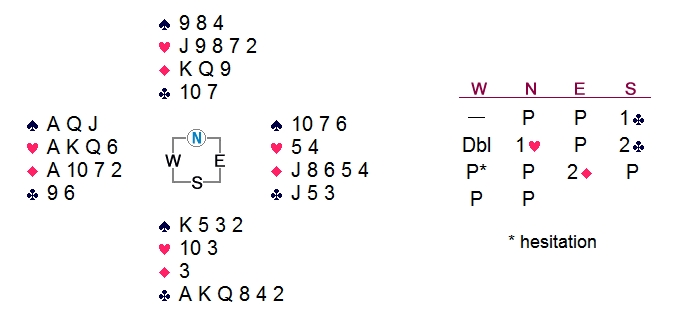

 |
 |
Rotten Officiating at the Sacramento Sectional
(This column is a reprint of Teditorial #2 from the Esoterica section)
At the recent local summer sectional, one player, two directors, and three members of an appeals committee all insulted themselves in grand fashion:

When east balanced with 2♦ after partner's hesitation, the director was properly summoned. I am told that east made some indignant comments about being accused of cheating. That statement was itself a clear violation of the proprieties should have been censured, but no. Instead, the director left the table to consult the head honcho, who apparently advocated "no action: the score stands".
Well, I'm sorry, folks, but that just doesn't get it. Here is the relevant quote from the rule book:
Law 73, Communication — Section F: Violation of Proprieties
"When a violation ... results in damage to an innocent opponent,
1. if the Director determines that a player chose from among logical alternative actions one that could demonstrably have been suggested over another by his partner's remark, manner, tempo, or the like, he shall award an adjusted score".
This means that, unless the director judged at the table that no alternative action by east was at all plausible, she was mandated by law to adjust the score. That was not done.
As east took nine tricks in his 2♦ contract, and that result
proved better than defending 2♣ for a 1-trick set,
the North-South pair naturally appealed the result. The committee was
comprised of a local Unit official, a highly experienced local club director, and
another highly experienced well-known player. These gentlemen unanimously
upheld the directors' non-ruling of allowing the score to stand.
Although I was not privy to all the discussion at the hearing, I was subsequently
informed that the director had failed to acquaint the participants with the pertinent
regulation — the aforementioned Law-73.
This is the so-called Law of Logical Alternatives, not so affectionately known by
some as "LOLA" (whatever LOLA wants, LOLA gets). Although imperfect,
the intent of the law is clear: a player is disallowed any favorable action that
could have been suggested by unauthorized information. No ethical judgment
is made, no mind needs to be read, and no self-serving statement is
considered. By law, any action that might have been suggested is cancelled,
and any such potential action is prohibited. This much is clear.
Or so it should have been, but this committee re-wrote the ending. Three possible scenarios spring to mind:
What do you think? Knowing that the opponents figure to own the
balance of power — possibly as much as 23-24 hcp, and knowing
that partner had declined a convenient opportunity to show a strong hand, would you
not consider a pass as an option?
Several days after the event, I discussed the matter with one of the
committee members, who readily acknowledged that a pass would have been
perfectly reasonable; yet this statement patently contradicts his vote in the
committee. This fact affirms the likelihood of Scenario #1 —
that the committee members had no clue as to what they were supposed to be doing,
the directors having failed to acquaint them with the pertinent regulation and
provide proper guidelines. Two of the members, however, had fairly recently
served on at least one other committee involving the same issue; so they had no
excuse.
And that's the news from the Land of Rotten Officiating. Sacramento, you can do better.